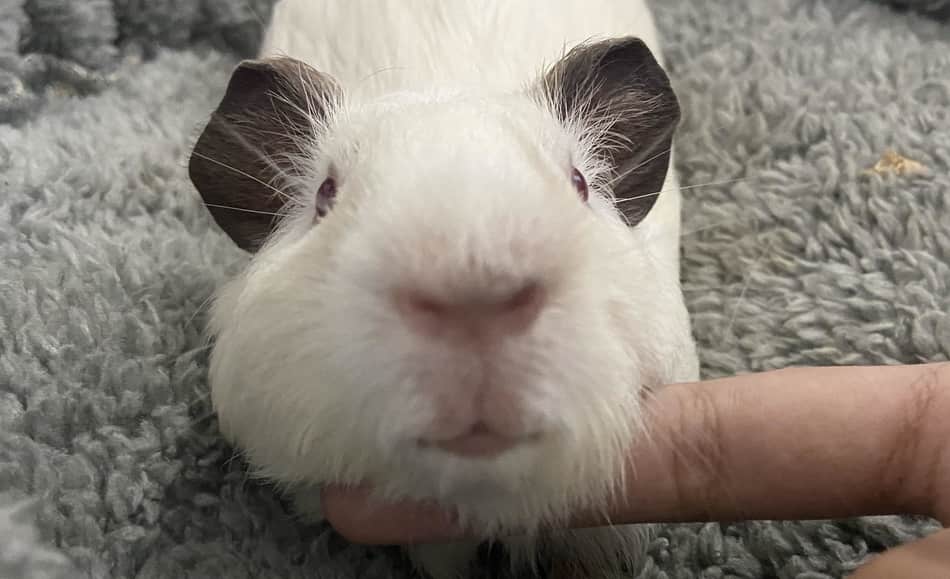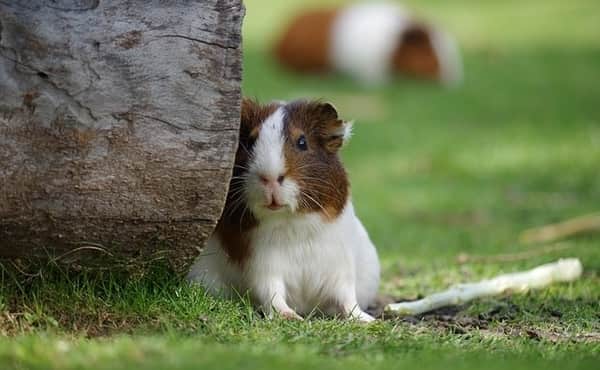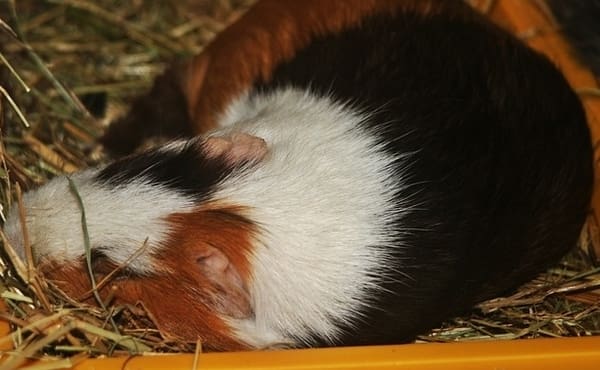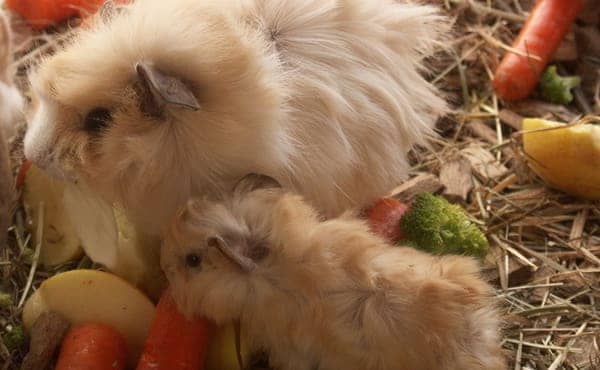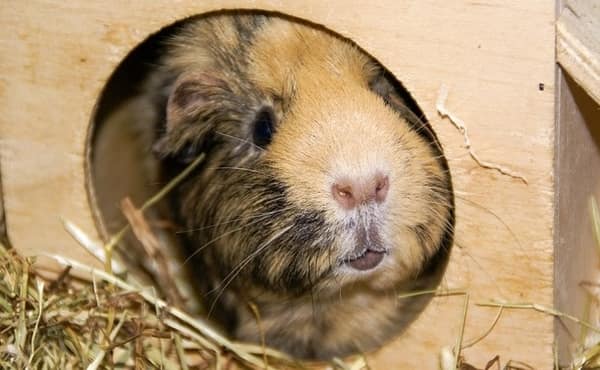Having pets in one’s home is a special kind of joy, especially if those pets are tiny and fluffy, like guinea pigs! Guinea pigs are great fun and wonderful pets for people of all ages, but sometimes we as pet owners run into confusing behavior, like why a guinea pig would not want its belly touched. Fortunately, chances are there is no need to worry.
Why won’t my guinea pig let me touch her belly? The most probable driver behind this behavior, especially if it is not new behavior, is that your guinea pig is listening to its instinct as a prey animal and dislikes having its belly exposed. There could, however, be a medical issue or even a possible pregnancy behind it as well.
In this article we will discuss the prey animal instincts of guinea pigs, medical issues that might prompt a piggie to not want its belly touched, and pregnancy. We will also briefly discuss socialization and handling of young piggies that affects their development and interaction with humans.
Basic (Prey Animal) Instinct
It might feel silly to think of guinea pigs in the wild—it is difficult to picture these little fluff balls full of personality and sass wandering around in mountainous grasslands, through the forest, or across a beach, but that is the case!
Guinea pigs hail from South America (not Guinea!) and occupy a wide variety of habitats, burrowing deep underground and only coming out at dawn and dusk to collect food or nesting materials. They live this way because they are prey animals, meaning they are a natural food source for various predators.
Being on the menu for a lot of things that are bigger and scarier than you is, well, scary. So, guinea pigs have evolved to have sharp senses to help them detect any potential danger as soon as possible so they can get themselves and their families (guinea pigs live in family units) to safety.
They are naturally weary of anything unfamiliar, especially if it is large. They also understand that they are vulnerable in certain positions or circumstances, for instance while they are eating, sleeping, during pregnancy, or if they are injured or have delicate parts of their bodies exposed—like their bellies.
For guinea pigs and many other animals, both prey and predator alike, the belly represents one of the most vulnerable parts of the body, second perhaps to the throat. It is not natural for guinea pigs to have their bellies exposed in any situation—the only time that would happen is if they have been captured by a predator who is about to make a meal of them.
For this reason, it seems highly likely that your guinea pig does not want its belly to be touched because it instinctively dislikes feeling vulnerable to that degree. While not all guinea pigs feel this way, there certainly are people who share their homes with piggies who love a good belly rub, it is wise to assume this is the case, barring other signs which we will discuss shortly.
Try not to force your piggie to accept unwelcome petting in the belly area, but if you insist on belly rubs, spend plenty of time establishing trust with your guinea pig first.
Do this by allowing your piggie to get used to your presence first: spend time near their enclosure and with your hand inside to sniff and examine; spend time on the floor with them in an exercise pen; finally, spend time with them in your lap or next to you with lots of pets on the head and back.
Additionally, any time you are playing with or petting your guinea pig, make sure to give them treats while you are at it, as this will help seal the bond between you and your piggie.
Do not fret if your furry friend never comes around to having its belly touched—some piggies simply never do. It does not mean they love you any less, they simply would rather have scratches behind their ears or pats on the head.
If you do not suspect your guinea pig’s prey animal instinct is behind this behavior, or if the behavior is new, your furry friend may be suffering from a medical issue.
Green around the Gills
While guinea pigs are typically hardy and healthy little creatures, they are still vulnerable to certain medical conditions, particularly respiratory conditions and gastrointestinal (GI) problems. GI issues may be why your guinea pig is averse to having its belly being touched, especially if this is a new development.
Your guinea pig has an extremely sensitive GI tract, so one of the most common GI problems your guinea pig may face is known as GI stasis. This occurs when movement in the digestive tract slows or stops for any reason, sometimes resulting in a blockage preventing food material from moving through the intestines and out of the GI tract.
This blockage and subsequent bloating may make your pal’s belly quite sensitive to the touch. Other signs to look for if you suspect GI stasis include:
- Decreased appetite and water intake
- Lethargy
- Hunched posture or abdominal stretching
- Behavioral changes
- Changes in or lack of feces (change in size, color, amount, texture, etc.)
GI stasis is common in small grazing mammals like guinea pigs and rabbits, who need their GI tract to be working constantly, and can result in extreme discomfort or fatality if not treated quickly.
A visit to the veterinarian right away will make sure your companion gets the treatment they need to be back to themselves in no time. Prevention is key, however, so ensure pal has an all-you-can-eat buffet of grass hay available with plenty of water and a stable, wholesome diet.
Another condition that could be causing stomach sensitivity for your companion is diarrhea. There is a specific balance of good gut bacteria, or ‘flora,’ in your guinea pig’s system that is necessary to maintain normal bowel function. Because of how delicate their GI tracts are, it sometimes does not take much to upset that balance.
If the good flora count is altered, bad bacteria can overgrow the system producing gas, slowing digestion, damaging tissues, and causing severe diarrhea. Other causes of diarrhea are certain parasites and antibiotics.
Symptoms to look for, aside from loose stools, include decreased or lack of appetite, dehydration, weight loss, or low body temperature. If diarrhea goes for too long without treatment it could end up being fatal. However, with treatment and plenty of fluids, most guinea pigs recover quickly.
Other medical conditions that may not seem as obvious but could just as easily cause your piggie to be averse to belly rubs are parasites such as mites, abscesses (infected swellings under the skin), or urinary problems. Always be aware of what your guinea pig is trying to tell you so you can catch when something is wrong right away.
Some general, non-specific signs your furry friend may be suffering from an illness or condition include lethargy, decreased appetite, and hunched posture. If you suspect illness always consult your veterinarian to be safe. Your companion will thank you for it!
If your furry friend never had an issue with its belly being touched before, and you do not suspect illness, it may be time to rule out pregnancy.
Bundles of Furry Joy
Guinea pigs, like most other rodents and small mammals, are prolific breeders who only take about five or six weeks to reach sexual maturity. Because of this, “surprise” babies are not uncommon in the guinea pig and small mammal community.
If your pal came from a pet store or breeder where it was kept with several other piggies, there is a chance it may have been pregnant before you even brought it home.
Conversely, if you thought you brought home a pair (or more) of same-sex guinea pigs, you may want to double-check, as sexing young guinea pigs is sometimes tricky (and not your fault if you did not know!) Bottom line—if your companion is suddenly averse to having its belly touched, it is time to check for bouncing baby pigs.
There are a few things you can look for when trying to determine if your pal is expecting, so make sure you have your veterinarian’s number handy just in case. The first logical step is to consider if your furry friend has or had its own furry friend in recent memory—it takes two to tango, after all.
Second, watch your companion’s eating habits. Has it been eating more lately? Pregnant sows (lady guinea pigs) can sometimes triple their food intake while pregnant, but this does vary from individual to individual.
Naturally, if your companion is expecting, they will gain weight. Most guinea pigs weigh between one and half to two pounds, so if you see that weight increasing, track it weekly—its weight will have doubled by the end of the gestation period.
Finally, a surefire way to determine if your guinea pig is pregnant is to feel for baby guinea pigs, or pups. In most cases, you can identify the presence of babies within about two weeks of conception. Very tenderly use your thumb and fingers, formed into a “C” shape, to gently glide over the tummy, pressing inwards (again, gently!) to feel for lumps in the belly.
If there is more than one pup, you should feel up to three or four lumps of a uniform size. Keep in mind there are other things that can cause lumps in a guinea pig’s abdomen such as abscesses and tumors, so be aware of other symptoms.
If you suspect pregnancy, contact your veterinarian right away to ensure your pal gets all the attention and treatment she needs, as her gestation period will only last between 66 and 72 days. Consult with your veterinarian and local experts for the best ways to care for your pregnant pal and her incoming babies and get ready for the joys of parenthood!
If nothing you have read here makes sense so far, there could be a final, sometimes overlooked, explanation as to why your piggie does not like having its belly touched—it was not handled or socialized enough as a pup.
Social Butterfly
Guinea pigs are naturally social—as we mentioned before, they live in family units in the wild and tend to enjoy having friends of their own species in domestic settings as well.
Most people who are familiar with guinea pigs agree that socializing guinea pigs from birth is a good idea and helps them grow to be calm and relaxed, therefore confident and happy, in the presence of humans.
Socialization in this context means gently picking up and handling the pups every day, even if just for a few moments, while making sure not to disrupt its bond or time spent with mama pig.
If your piggie pal does not like its belly to be touched, it could be that it did not receive this socialization and simply is not as comfortable around humans as other piggies.
That is not to say that it does not like you or will have behavioral issues, it simply may never want to feel exposed. This is no reason to be concerned, however, as there are plenty of other ways to bond with your furry friend as discussed already.
Conclusion
If your guinea pig does not let you touch its belly, chances are it is nothing personal—it has an instinctual drive to protect its delicate underside from predators. Do your best to help your pal feel safe and welcome in your home and bond with it gently. Do not force belly rubs, it may come around eventually or not, and either way is okay.
If your piggie’s behavior is new, it could be suffering from a medical condition such as GI stasis or diarrhea, so check for other symptoms and call your vet for treatment. Additionally, your companion could be expecting a few bundles of furry joy, so check for signs of pregnancy, and again, call your vet!
Finally, your guinea pig, though naturally a social creature, may not have gotten the human socialization it needed as a pup and simply does not like its belly being touched, which is perfectly okay.
In any case, if you are attentive to the needs of your precocious pal, bonding with your guinea pig may or may not involve belly rubs, but it will involve lots of love and fun for years to come.

